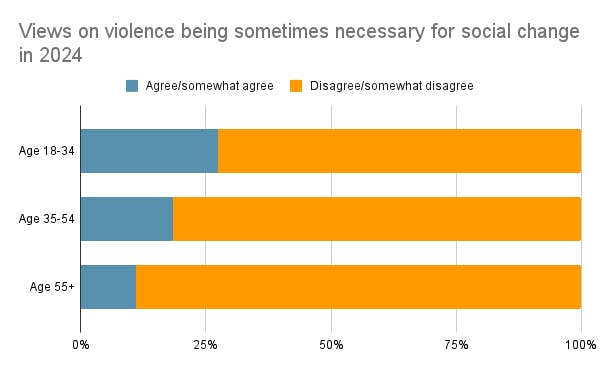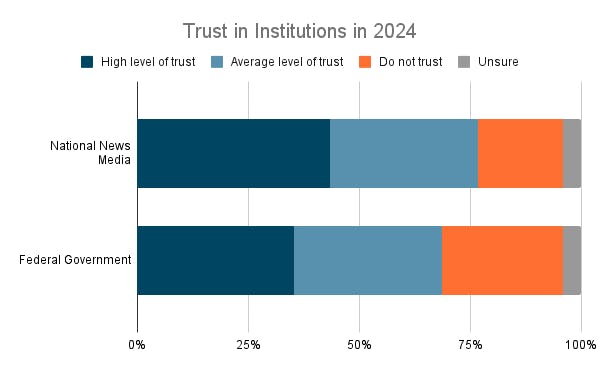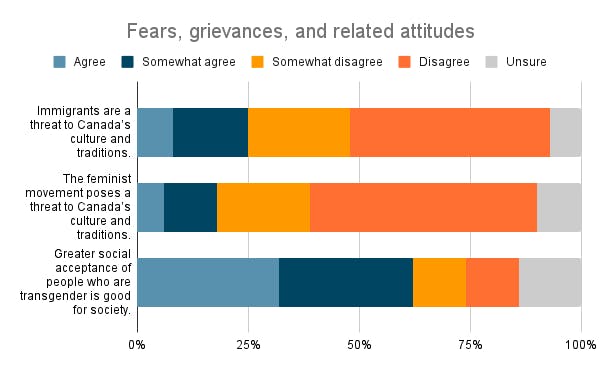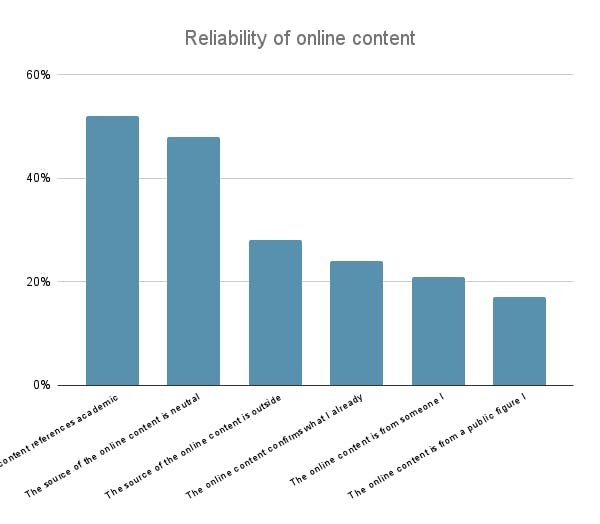Ideologically motivated violent extremism (IMVE) is on the rise in Canada and its effects are being experienced throughout society. The erosion of public trust in political and social institutions, increasing polarization between communities, and a growing wave of misinformation, disinformation, and conspiracy theories are putting Canadians at greater risk of violent extremism.
Narratives promoting homophobic, misogynistic, and xenophobic sentiments are becoming increasingly present in mainstream discourse, thereby exposing an increasing number of Canadians to this harmful information and violent content—whether they are looking for it or not. Greater exposure to extreme narratives online risks normalizing these views, producing a societal-level increase in acceptance of violence both online and offline.
Since 2023, Digital Public Square has been exploring new ways to counter mis and disinformation promoting IMVE narratives among vulnerable Canadians. Project COMET adopts an upstream approach that focuses on communities that are affected by extreme content online.
This report highlights key takeaways from two nationally representative surveys conducted in June 2023 and January 2024 as part of Project COMET. The two waves of surveys shed new light on Canadians' views towards political violence, trust in institutions, and misinformation while providing novel insights about the subsets of the population who are vulnerable to IMVE narratives and rhetoric.
Methodology
The surveys were commissioned by Digital Public Square and were conducted by Nanos Research. Nanos conducted online representative non-probability surveys of 2088 Canadians and 2101 Canadians, 18 years of age or older, between June 12th and 25th, 2023, and January 24th and February 6th, 2024, respectively. The sample was geographically stratified to be representative of Canada.
Key takeaways
- 20% of Canadians express high acceptance of political violence, including 26% of young Canadians.
- Canadians with higher acceptance of political violence were more likely to distrust institutions like the government and the media.
- A significant subset of Canadians feel threatened by marginalized groups such as immigrants.
- Canadians agree that misinformation contributes to extreme political beliefs, but lack consensus on credible and reliable information sources.
High acceptance of political violence among young Canadians
A minority, but sizable, proportion of Canadians agree that violence is sometimes necessary for social change, with young people particularly in agreement. In 2023, 20% of Canadians agreed or somewhat agreed that violence is sometimes necessary for social change, a proportion that slightly decreased to 17% in 2024. Canadians’ support for groups willing to defy the law for their principles also declined from 31% in 2023 to 22% in 2024.
However, young Canadians aged 18-34 were notably more likely to agree that violence is sometimes necessary for social change. Specifically, from the 2024 survey, we found that 26% of young people agreed or somewhat agreed that violence is sometimes necessary for social change, in stark contrast to only 11% of those aged 55 and older. Additionally, nearly one in four young people (24%) found it acceptable or somewhat acceptable if protests make people feel unsafe. This underscores the apparent higher level of acceptance of violence for social change among young Canadians.
Despite the overall decline in Canadians’ acceptance of political violence, the threat of emerging violent groups remains. In 2024, 1 in 10 Canadians reported personally knowing someone who would consider joining a group that uses the threat of violence to advance their beliefs, and 14% of Canadians agreed that it is acceptable if protests or actions make people feel unsafe to bring about political change. These findings suggest that there is a risk of normalization of political violence in Canada, particularly among youth.

Canadians with higher acceptance of political violence were more likely to distrust institutions
Previous studies on violent extremism have identified trust in institutions as a potential protective factor against violent extremism, which is why it is important to understand current and shifting levels of trust in these institutions.
Our surveys showed that Canadians reported moderate levels of trust towards the national news media (2023: 5.8 out of 10, 2024: 5.7 out of 10) and the federal government (2023: 5.2 out of 10, 2024: 5.0 out of 10), scoring between 5 and 6 on a scale of 0-10 with 10 being the highest trust rating. These ratings did not change significantly between 2023 and 2024.
Trust levels varied according to political leaning: right-leaning Canadians had a lower level of trust than left-leaning Canadians in national news media (trust mean score 6.4 out of 10 left-leaning; 5.0 out of 10 right-leaning), and the federal government (trust mean score 6.3 out of 10 left-leaning; 4.3 out of 10 right-leaning). We also observed that trust in national news media varied significantly depending on age. Only 35% of young people age 18-34 reported high trust in national news media, compared to 77% of Canadians age 55 and over.
A proportion of Canadians had exceedingly low levels of trust (0-3 out of 10) in the media and the federal government. In 2024, nearly 20% of respondents indicated little to no trust in the media, and 27% had little to no trust in the federal government. While overall ratings of these institutions are moderate, there are still substantial subsets of the population that have extremely high levels of distrust, similar to the proportion of Canadians who reported higher acceptance of political violence.

Despite moderate levels of trust overall, an undertone of distrust towards the government prevails. A majority of Canadians agreed or somewhat agreed with the statement that “A lot of important information is deliberately concealed from the public by the government.” (2023: 65%, 2024: 62%) In 2024, right-leaning Canadians were more likely to agree or somewhat agree with this statement (77%) compared to left-leaning Canadians (48%).
Upon analyzing the data further, we found that acceptance of political violence and trust in institutions were negatively correlated, suggesting a relationship exists between these factors. In other words, those with higher acceptance of political violence were more likely to distrust institutions. The results of this analysis will be explored in further detail in a separate report.
The extremely low levels of trust in the federal government among subsets of the Canadian population are therefore concerning, as they have important implications for growing polarization and deteriorating confidence in Canadian democracy. Meanwhile, the lower trust among young people towards the national news media points to a generational divide that could impact the future landscape of media consumption and trust in public institutions.
A significant subset of the population feels threatened by marginalized groups
Seeking to attract more followers, IMVE actors and groups in Canada often promote misogynistic, xenophobic, and homophobic narratives and ideologies by amplifying preconceived notions and prejudices against traditionally marginalized groups.
A significant subset of the population feels threatened by marginalized groups, despite a broad theoretical belief in equal rights for all. In both 2023 and 2024, nearly 90% of Canadians agreed that everyone, regardless of race or religion, should benefit from the same rights (2023: 90%, 2024: 89%). Further, in 2024, 71% of Canadians agreed or somewhat agreed that minority religious groups, such as Muslims, Hindus, Sikhs, and Jews, positively contributed to Canadian society, which was an increase from 62% in 2023.
However, a significant number of Canadians view immigrants as a threat to Canadian cultures and traditions, with this belief rising from 25% in 2023 to 31% in 2024. In particular, Canadians with higher acceptance of political violence were more likely to agree with this statement compared to other Canadians. The correlation between perceived threats from immigrants and acceptance of political violence plays an important role in underlying xenophobia that could undermine social cohesion.
Furthermore, concerns about losing freedoms due to diversity and inclusion issues are prevalent among Canadians. In 2023, a portion of Canadians viewed immigrants (25%) and the feminist movement (18%) as threats to Canada’s culture and traditions, and disagreed that greater social acceptance of people who are transgender is good for society (24%). This points to a broader resistance to social progress and equity initiatives, possibly fueling discrimination against vulnerable groups.

Canadians agree that misinformation contributes to extreme political beliefs, but lack consensus on sources of credibility and reliability
According to the 2023 survey, eight in ten Canadians agreed that misinformation contributes to extreme political beliefs, with left-leaning Canadians (93.1%) more likely to agree than right-leaning Canadians (79.0%). Although there is a general consensus on the correlation between misinformation and extreme political beliefs, the criteria for determining the credibility and reliability of online content vary widely. We asked respondents what content and sources they believe make online content reliable. For about 50% of Canadians, the credibility and reliability of online content stem from academic references, scientific studies, and neutrality. This percentage drops to around 21-28% if the content comes from outside traditional mainstream media, confirms preexisting beliefs, or is from someone they know. Respondents said that the least credible online content comes from a public figure they know or is presented with a passionate tone.
Interestingly, those who reported higher acceptance of political violence are twice as likely to believe passionate online content is more reliable (27%) than the rest of the sample (13%). They are also more likely to find online content outside of traditional mainstream media to be reliable (34%), compared to the rest of the sample average (27%).

The widespread belief that misinformation contributes to extreme political beliefs underscores the importance of addressing the issue to maintain social cohesion. However, distrust of mainstream media and skepticism of academic and scientific studies among those accepting of political violence pose challenges for providing effective alternatives to misinformation.
This challenge calls for the development of innovative solutions to engage Canadians at risk of supporting violent extremism with content that counters harmful misinformation and online narratives and promotes prosocial outcomes. More broadly, the survey results demonstrate a pressing need to rebuild trust in Canadian institutions to counteract a rising tide of violent extremism.

